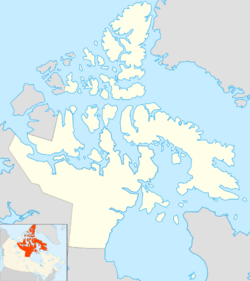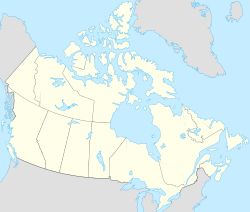Kingak Island facts for kids
| Geography | |
|---|---|
| Location | Coronation Gulf |
| Coordinates | 68°09′N 112°16′W / 68.150°N 112.267°W |
| Archipelago | Canadian Arctic Archipelago |
| Administration | |
| Territory | Nunavut |
| Region | Kitikmeot |
| Demographics | |
| Population | Uninhabited |
Kingak Island is a small, uninhabited island in Canada's far north. It's found in a large body of water called the Coronation Gulf, which is part of the Arctic Ocean. This island is located south of a much bigger island called Victoria Island. Kingak Island is part of Nunavut, Canada's largest and northernmost territory, specifically in the Kitikmeot Region.
The highest point on Kingak Island is about 40 meters (131 feet) above the sea. That's roughly the height of a 13-story building!
Contents
Where is Kingak Island?
Kingak Island is located in the Coronation Gulf, a large arm of the Arctic Ocean. This gulf is between the mainland of Canada and Victoria Island. The island is part of the vast Canadian Arctic Archipelago, a group of many islands in the Arctic.
Nunavut is a huge territory in northern Canada. It was created in 1999 and is mostly home to the Inuit people. Nunavut has a very cold climate and a lot of its land is covered in tundra and permafrost.
Nearby Islands
Kingak Island isn't alone in the Coronation Gulf. It has many island neighbors. Some of these nearby islands include Anchor Island, the Duke of York Archipelago, Hokagon Island, Kabviukvik Island, Mangak Island, Nanortut Island, Nanukton Island, and Takhoalok Island. These islands are all part of the same amazing Arctic landscape.
Life on the Island
Kingak Island is uninhabited, meaning no people live there permanently. This is common for many small islands in the Arctic. The harsh weather and remote location make it difficult for humans to settle there.
Arctic Environment
Even though no people live on Kingak Island, it is still part of a lively ecosystem. The Arctic environment is home to many animals adapted to the cold. These might include polar bears, Arctic foxes, and various types of seals. Birds also visit the islands during the warmer months.
The plants on the island would be typical of the Arctic tundra. This means you'd find low-growing plants like mosses, lichens, small shrubs, and hardy grasses. These plants can survive the cold temperatures and short growing seasons.
The Coronation Gulf
The Coronation Gulf itself is an important waterway. It connects to other parts of the Arctic Ocean. It's named after the coronation of King George IV in 1821. This gulf is often covered in sea ice for much of the year.
Importance of the Gulf
The Coronation Gulf is important for wildlife. It provides habitats for marine mammals and fish. It is also a traditional hunting and travel route for the Inuit people. They have lived in this region for thousands of years.
 | Jewel Prestage |
 | Ella Baker |
 | Fannie Lou Hamer |



